"Mountains rise in the polders and the dyke runs through the desert" (Kader Abdollah)
Literature from authors with migrant background in German translation
Migrant literature has been doing well in the Dutch-speaking world for quite some time. What initially looked like a short-term hype has become a long-term success. After the first big successes, it even seemed as if a foreign name had become condition to publish. (Leibovici, 2001). Most authors with a migration background publishing in the Netherlands or in Flanders write in Dutch, but some also write in several languages. Migrants who live in the Netherlands or Flanders but do not write in Dutch are not discussed here. The same applies to authors from Suriname and the Antilles (For these authors, see: Caribbean Literature; Literature from Suriname and the Caribbean in Swedish translation).
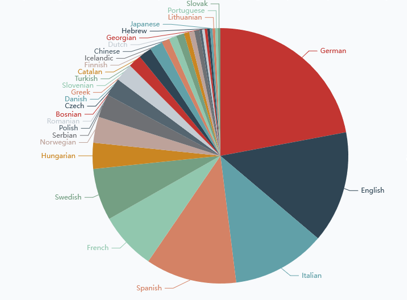
The export of migrant literature is explicitly encouraged by intermediary and subsidising bodies in the Netherlands and Flanders (see Government support and Berkers, 2011, p. 32; #Fairs). And they have success. Not only at home, bus also abroad, Dutch-language literature by migrants has attracted a lot of attention. Most translations appeared in German, English, Italian, Spanish, French and Swedish, but there are also many translations to other languages. The most frequently translated authors in all these languages are Kader Abdolah, Abdelkader Benali, Moses Isegawa, Ayaan Hirsi Ali, Lulu Wang, Rodaan Al Galidi, Laia Fàbergas, Hafid Bouazza, Ramsey Nasr and Simone Atangana Bekono.
Migration and Diversity
In no country live only people born on its own territory. Migration increases diversity and raises questions not only about fundamental rights, housing, education, social security but also, not least, about the importance and status of our own (cultural) identity (Kleinhans, Van Ostaijen, Seibel, 2022, p. 7). Authors with a background of migration write about social problems, the interpretation of the past, the clash between cultures and the issue of 'own' and other'. The literature of authors with a background of migration is not only the result of increasing diversity (and, of course, increasing integration in the literary landscape) but also opens the eyes to the complexity of the phenomenon. With their literature, migrants create the space to discover new perspectives on, possibilities for, the future.
The literature of authors with a background of migration creates diversity! Thus, it is about more than just a message or an indictment. "Social problems need social solutions," Hafid Bouazza rightly stated in 2004 (Bouazza, cited by Bouma, 2011, p. 25). Literature creates space for experience, opens perspectives on the future. The power of literature does not lie in the known, the recognizable and their opposites: the unknown, the unrecognizable. The power of literature does not or does not lie primarily in what is or is not selected, but in the dynamism with which what seemed or seems to be self-evident repeatedly reveals itself as something strange. (Van Uffelen, 2004)
Reception in the German-speaking world
Despite the fact that some were of the opinion that in the German language area dealing with foreign cultures was hampered by 'ethnocentric priorities' (Chiellino, 2000), the literature of migrants from the Netherlands and Flanders in the German language area enjoyed great success. The keywords that determined the reception of migrants' literature translated from Dutch are not really different from those that determined the reception in the Dutch-speaking region: mediation, enrichment and breaking through monocultural reception, subverting hierarchies (Grüttemeier 2001, p. 17). Contrary to expectations, the debate on the literature of immigrants translated from Dutch is not primarily about the ethnic background of the authors (Berkers, 2011, p. 36) nor, in most cases, about the importance of their literature as a political-social-cultural phenomenon. The literary quality of the works discussed, plays, especially in the first phase, an important role.
Why bloody beautiful?
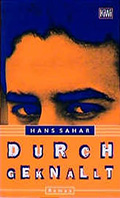
In the late 1990s, the first translations of works by authors with a background of migration from the Netherlands and Flanders hit the German market. The start shot was fired by the Moroccan Author Hans Sahar in 1997. In that year, Kiepenheuer publishes the translation of his Hoezo bloedmooi? under the title Durchgeknallt. In this novel, Sahar describes, to quote a German reviewer, " Aggressively and without glossing over anything" (Durchgeknallt 1998), the everyday life of a Moroccan migrant worker's child. The book had caused quite a stir in the Netherlands and definitively brought the Moroccan-Dutch authors of the 1990s to the attention of the general Dutch public. In the German-speaking world, things remained rather quiet. Migrant Dutch-language literature was not yet a household word. That would only change with the breakthrough of Abdelkader Benali and Kader Abdolah.
Abdelkader Benali
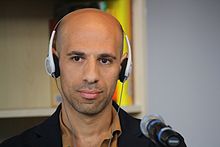
Photo: Wikipedia
In 1998, Abdelkader Benalis Hochzeit am Meer is published, the translation of his Bruiloft aan zee, which was in the Netherlands nominated for the Libris Prize and celebrated as the best debut novel of the year. Benali came to the Netherlands as a child with his parents from Morocco. Obviously, ‘life between two cultures’ is one of the central themes of his book, but in the german language area the novel is not received as a "multicultural development novel" (Kresta, 1998). German reviewers are particularly fascinated by the literary character of the work and the the way Benali associatively connects the most diverse themes and repeatedly calls into question different touch points. Benali does this very radically in the eyes of German reviewers. Benali writes "like a Beserker" (Steinberger, 1998), writes the Süddeutsche Zeitung. And that what the Handelsblatt describes as a "sensitive portrayal of love and infidelity" (Lieber ins Bordell, 1998) is, for Karin Steinberger, the work of a "fabulator without mercy" (Steinberger, 1998). According to Steinberger, the essential characteristic of Benali's style is the fact that he even has "no particular style" (Steinberger, 1998). The German-speaking critics appear simply to enjoy Benali's play of and with stories to the full, which one can then make disappear between one's teeth like "whipped cream on raspberry sauce" (Langer, 1998).

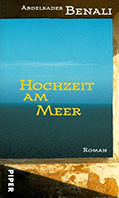
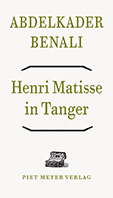

After Hochzeit am Meer, things went quiet around Benali in the German-speaking world. This does not mean that he was no longer present. In 2009, Benalis Migration als Märchen will be published as an online-ressource in Oldenburg, and in 2019 Henri Matisse in Tanger, Benali's trace to his own past, will be published, but basically Benali will disappear from the spotlight in the German-speaking world anyway.
Kader Abdolah

Photo: Wikipedia
Kader Abdolah, who came to the Netherlands from Iran as a refugee in 1988, made his debut with short stories. He experienced his breakthrough with the publication of his semi-autobiographical novel De reis van de lege flessen (1997). Two years later, the book was published in German translation in Berlin under the title Die Reise der leere Flaschen. The "simple language" (Die Reise der leeren Flaschen, 1999) in which the book was set was more often than not viewed negatively in the Dutch language area. In the German language area, it was felt that Abdolahs ‘simple’ language made his work rather "expressive" (Die Reise der leeren Flaschen, 1999). The very fact that Abdolah creates distance with his language is particularly appreciated.
"It is not big, loud emotions that Abdolah, who himself had to go through the experience of being a political refugee, talks about. It is small humiliations and misunderstandings that make life difficult for the foreigner. Homesickness remains, but the chances of returning are slim. The reader is left with thoughtfulness." (Weingärtner, 2001)
It is precisely the fact that the author does not seek effect that makes his work so fascinating (Hanika, 2003; J.A., 1999). Moreover, one finds it interesting how Abdolah "step by step combines the new with [...] the old" (Euler, 2001). In a similar way, in Die geheime Schrift (2003) - in which the exilant Esmail translates his deaf-mute father's manuskript about his life in a Persian village and thus learns more about his own lineage. That way he spans an arc "between two completely different worlds" (Kader Abdolah, 2011).
"At the beginning there is an early historical mystery, at the end the magic of art." (Gauss, Karl-Markus, 2003)
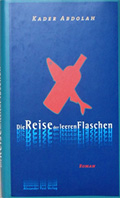
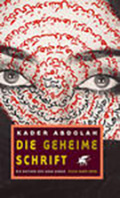
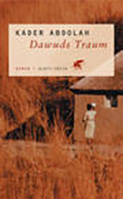
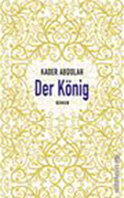
Kader Abdolah's work was well received in the German-speaking world. Despite this, Abdolah had to keep looking for a new publisher.The fact that grant funds such as the Literature Fund only subsidise two publications has certainly played a role in this. That was probably the main reason why young publisher Alexander Fest stopped publishing Abdolah's work after Die leeren Flaschen, Klett-Cotta after Dawud's Traum and Claasen/Ullstein after Der König.
When Een papegaai vloog over de IJsel (A parrot flew over the IJsel) (2014) appeared, apparently no one in the German-speaking world was willing to publish a translation anymore. Although the very literary strength of Abdolah's work was repeatedly highlighted in criticism, publisher Ullstein, where Abdolah's last works had been published, feared that Abdolah's story about a refugee camp would not be accepted by German readers precisely because of its "unstructured way of telling the story" (Kuby, Christiane, 2021). Apparently, the publisher was convinced that for German readers the message was more important than the form. Not really understandable given that the reception of Abdolah's translations in the German-speaking world has shown otherwise.
Other authors of migrant literature who debuted in the Dutch language area in the 1990s were Hafid Bouazza, Moses Isegawa, Rashid Novaire and Vamba Sherif.
Hafid Bouazza
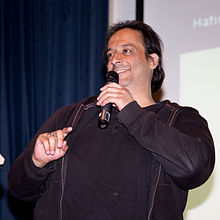
Photo: Wikipedia
Contrary to what might have been expected, the Moroccan author Hafid Bouazza, who attracted a lot of attention in the Dutch language area, did not end up playing such an important role in the German language area. In the late 1990s, the Neue Rundschau did publish some translations but he had to wait until 2005 for the publication of his first novel. That's when Klett-Cotta, published the German translation of his much praised and "fairytale-like" (Farsaie 2005) novel Paravion (originally 2003). In this novel, Bouazza tells the story of a village emptied by migration. And again, one is fascinated by the style. Irene Binal particularly admires the way Bouazza " weaves fantasy and reality into a colorful entity" (Binal, 2006) and concludes her contribution as follows:
"Hardly ever before have shattered dreams and dashed hopes been thematized in such a sparkling, clever and entertaining way" (Binal, 2006)
But despite such positive reactions, the book did not become a success. Publisher Klett-Cotta ultimately did not pursue Bouazza.
Moses Isegawa
Getting more attention at the turn of the century was Moses Isegawa (Uganda). His debut novel Abessijnse kronieken (Abessinian Chronicles) was published in 1998. The book enjoyed great success in the Dutch-speaking world and was repeatedly translated. The German translation appeared in the year 2000.
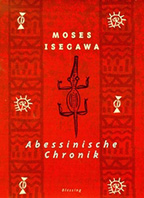
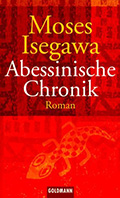
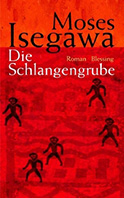
"'Abesinnische Chronik' is a family saga and a novel of development, a civil war epic and a picaresque play. Reading it is captivating and fascinating, entertaining and amusing. The novel brings to mind Gabriel Garcia Márques and Salman Rushdie, Isabel Allende's Geisterhaus and, above all, Hans Jakob Christoffel von Grimmelshausen" (Loimeier, 2000)
Although Isegawa explicitly declares that his work "do not fulfil a task and no mission" (Binal, 2000), by no means all critics are convinced that it does. Many reviewer in the German-speaking world simply misses the necessary "Balance between exciting narrative and dazzling meaning" (Michalzik, 2000) and "clear, narrative lines" (Michalzik, 2000). Irene Binal, too, would have liked it better if Isegawa "would have been even more aware of his responsibility for the story told" (Binal, 2000). However, there are also other opinions. What one finds less successful, another apparently finds fantastic. The way Isegawa connects "Fantasy and authenticity" (Fliedl, 2000) "plastically, colorfull" (Péus, 2000) turns out not to be so bad after all. The Wiener Zeitung even predicted that Isegawa's "magnificent piece of fiction" (Loimeier, 2000) would become a bestseller. Regardless, the latter remained a wishful thinking. Another paperback edition of the Abyssinian Chronik was published by Goldmann in 2001, and the translation of Slangenkuil (dt. Die Schlangengrube (The snake pit) was also published in 2002. But then it became quiet around Moses Isegawa in the German-speaking world.
(Herbert Van Uffelen)
References
Berkers, Pauwke: Etnische grenzen in de literatuur. In: Migrantenstudies, Nr. 1, (2011) - p. 22-42.
Binal, Irene: Ein Balanceakt zwischen den Geschichten. - Moses Isegawa und seine "Abessinische Chronik". In: Neue Zürcher Zeitung, Vol.: Nr. 93 [19.04.2000] - Zürich, (2000)
Binal, Irene: Von Auswandern und Daheimgebliebenen - Hafid Bouazzas böses Märchen von Süden und und Norden. In: Neue Zürcher Zeitung, Vol.: 7, Issue: 10. Jan., (2006) - p. 25
Bouma, Erica: De mogelijkheden voor migrantenliteratuur in het (literatuur)onderwijs. Masterscriptie. Utrecht, (2011)
Chiellino, Carmine: „Interkulturalität und Literaturwissenschaft". In: Ders. (Hg.): Interkulturelle Literatur in Deutschland. Ein Handbuch. Stuttgart/ Weimar (2000) - p. 387-398.
Die Reise der leeren Flaschen. In: Bibliotheks- und Medienberatungsstelle. Besprochene Bücher, Frühling, 1999.
Durchgeknallt. In: Buchkultur, 1, (1998) - p. 51. (https://www.buchkultur.net/iwb_buk_issues/ausgabe-nr-50/)
Euler, Annemarie: Abdolah, Kader: Die Reise der leeren Flaschen. In: Education permanente - Zeitschrift der SVEB, Vol.: Nr. 2, (2001)
Farsaie, Fahimeh: Das Erbe der Allochthonen - Hypnose - In Hafid Bouazzas Roman 'Paravion' sitzen die Auswanderer auf fliegenden Teppichen. In: Freitag, Vol.: 42 [21.10.2005], (2005) - p. 23
Fliedl, Konstanze: Simplicissimus ugandisch - Moses Isegawas erzählt von afrikanischer Heimat. In: Der Standard, Vol.: Nr. 3616 - Wien, (2000) - p. 11
Gauß, Karl-Markus: Keilschrift und Postmoderne - Der iranische Autor Abdolah Kader und sein meisterliches, opulentes Werk. In: Die Zeit, Vol.: März - Hamburg, (2003)
Grüttemeier, Ralf: ‘Migrantenliteratuur in de Nederlandse en Duitse letteren’. In: Neerlandica extra Muros 39, 3, oktober, (2001) - p. 13-25.
Hanika, Iris: Zusammengefaltetes Brot - Der Iraner Kader Abdolah erkundet „Die geheime Schrift und schreibt in Fremdsprache über die Heimat des Exilanten. In: Berliner Zeitung, Vol.: 28-04-2003 - Berlin, (2003)
J.A.: Die Reise der leeren Flaschen - Entdeckung des Fremden. In: Hellweger Anzeiger, Vol.: 23-07-1999, (1999)
Kader Abdolah. In: Internationales Literaturfestival Berlin, 2011 (https://www.literaturfestival.com/autoren/autoren-2014/michael-de-cock)
Kleinhans, Reinout; Van Ostaijen, Marc; Seibel, Kimberly (ed.): De migratiesamenleving. Den Haag, (2022)
Kresta, Edith: Transkulturelle Seelenlandschaft. In: die tageszeitung, Vol.: 21-12-1998, (1998)
Kuby, Christiane: In de voetsporen van de dichters - Kader Abdolah in het Duits. In: Filter - Tijdschrift over vertalen, Issue: 6, (2021) (https://www.tijdschrift-filter.nl/webfilter/dossier/kader-abdolah/2021-6/in-de-voetsporen-van-de-dichters/)
Langer, Tanja: ‘Benali ist kein Löwe hinter Gittern‘. Die Welt, 17 oktober, (1998)
Leibovici, Solange: Migrantenliteratuur. In: De groene Amsterdammer, 17 maart, (2001)
Lieber ins Bordell. In: Handelsblatt, Vol.: 19-11-1998, (1998)
Loimeier, Manfred: Der Preis der Freiheit. - Die Stars J. M. Coetzee und Moses Isegawa führen die afrikanische Literatur aus ihrem Schattendasein heraus. In: Deutsches Allgemeines Sonntagsblatt, Vol.: Nr. 19 [12.05.2000] - Hamburg, (2000)
Michalzik, Peter: Jenseits von Abessinien. Beobachten und zuschlagen: Der gefeierte Erstlingsroman des afrikanischen Autors Moses Isegawa. In: Süddeutsche Zeitung, Vol.: [04.02.2000] - München, (2000)
Péus, Gunther: Bericht vom Leben am Abgrund. Ein großer Roman aus Uganda. In: Die Zeit, Vol.: Nr. 31 [27.07.2000] - Hamburg, (2000)
Steinberger, Karin: Die Gier nach Büchern - Abdelkader Benali liest in der Amalienbuchhandlung aus seinem Roman „Hochzeit am Meer'. In: Süddeutsche Zeitung, Vol.: 09-09-1998 - München, (1998)
Van Uffelen, Herbert: Fremd sein unter Fremden’. In: Van Uffelen, Herbert, Weissenböck, Maria & Decloedt, Leopold (eds.), Rezeption, Interaktion und Integration. Wien: Edition Praesens, (2004) - p. 209-230.
Weingärtner, Till: Kader Abdolah - Die Reise der leeren Flaschen. In: Lettern.de, (2001) (http://www.lettern.de/reabdo.htm)
